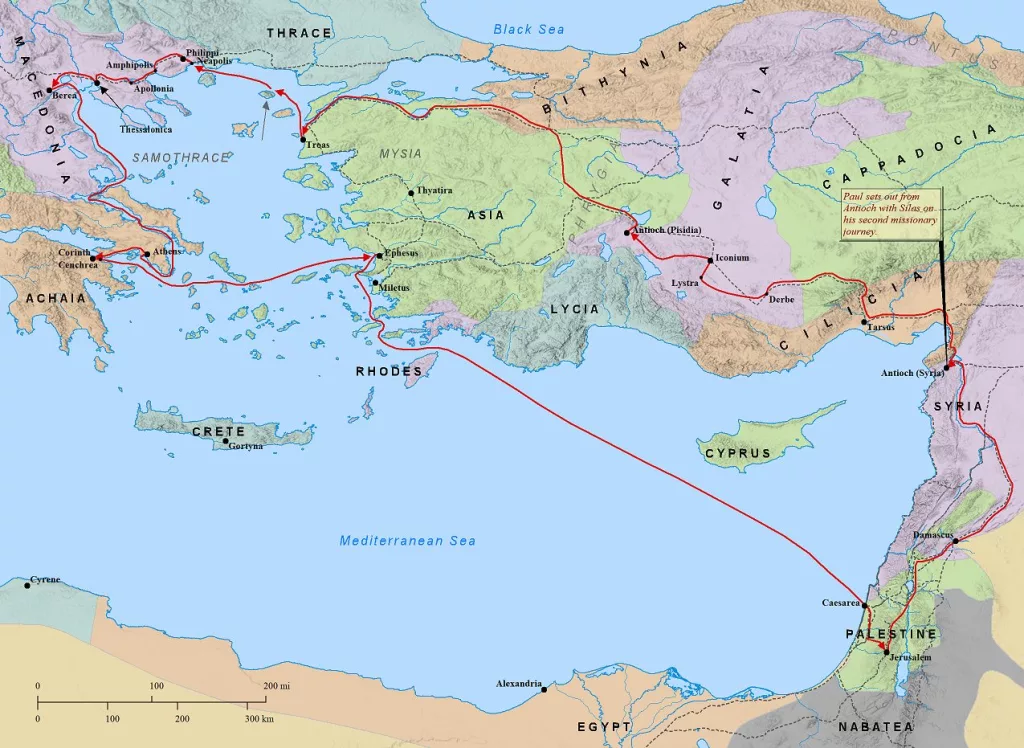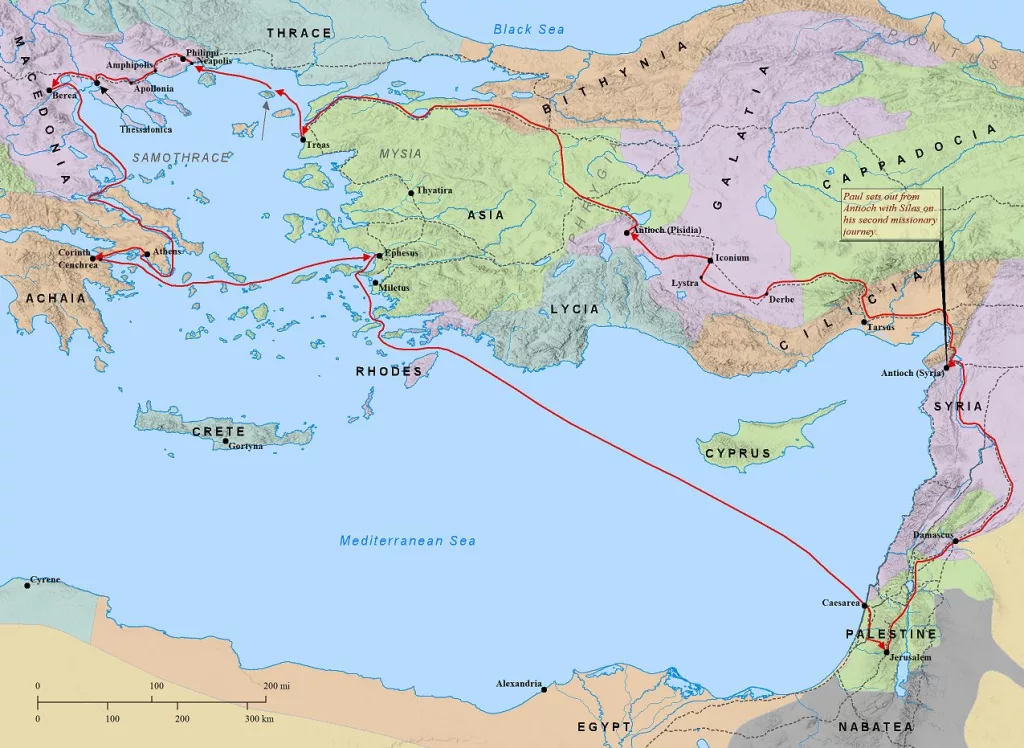Jerusalem Council
After their first missionary journey, Paul and Barnabas went back to Antioch and told them of all that God had done. Some Jewish men came from Israel, though, and started teaching the people that the Gentiles (non-Jewish people) had to be circumcised and follow the laws of Moses. Paul and Barnabas strongly disagreed. The church leaders in Antioch decided that Paul and Barnabas should go to Jerusalem and ask the apostles and elders whether this was true.
The elders of the church met together and discussed the situation. Peter told them about the vision that God had given him, showing him that he was not to consider Gentiles to be unclean anymore; God had made them clean.
Acts 11:5-10 (NASB)
5 “I was in the city of Joppa praying; and in a trance I saw a vision, an object coming down like a great sheet lowered by four corners from the sky; and it came right down to me,
6 and when I had fixed my gaze on it and was observing it I saw the four-footed animals of the earth and the wild beasts and the crawling creatures and the birds of the air.
7 “I also heard a voice saying to me, Get up, Peter; kill and eat.
8 “But I said, By no means, Lord, for nothing unholy or unclean has ever entered my mouth.
9 “But a voice from heaven answered a second time, What God has cleansed, no longer consider unholy.
10 “This happened three times, and everything was drawn back up into the sky.
There was much debate, because they had all been raised to believe that they were God’s only people. Jesus said in John 4:22, “salvation is from the Jews.” This meant that God’s salvation from sin and death came through the Jewish nation – Jesus. This did not mean that they were the only people who could be saved. It also did not mean that Gentiles (non-Jews) had to become Jews.
Salvation for Everyone
Eventually, they agreed to send this letter with Paul and Barnabas, along with some other men, back to Antioch.
Acts 15:23-29 (NASB)
23 and they sent this letter by them, “The apostles and the brethren who are elders, to the brethren in Antioch and Syria and Cilicia who are from the Gentiles, greetings.
24 “Since we have heard that some of our number to whom we gave no instruction have disturbed you with their words, unsettling your souls,
25 it seemed good to us, having become of one mind, to select men to send to you with our beloved Barnabas and Paul,
26 men who have risked their lives for the name of our Lord Jesus Christ.
27 “Therefore we have sent Judas and Silas, who themselves will also report the same things by word of mouth.
28 “For it seemed good to the Holy Spirit and to us to lay upon you no greater burden than these essentials:
29 that you abstain from things sacrificed to idols and from blood and from things strangled and from fornication; if you keep yourselves free from such things, you will do well. Farewell.”
This was revolutionary thinking. They considered the Old Testament scriptures, what Jesus had said and accomplished by fulfilling those scriptures, as well as the testimonies from Peter, Paul, and Barnabas. After praying, it was obvious to them what God had done. There were still many people who disagreed with them – those who were unwilling to let go of the traditions of the past, but they saw that God was doing a new thing, and they did not want to stand in His way.
After this, Paul became known as the apostle to the Gentiles (non-Jews).
Romans 11:13 (NASB)
13 But I am speaking to you who are Gentiles. Inasmuch then as I am an apostle of Gentiles, I magnify my ministry,
Galatians 2:7-9 (NASB)
7 But on the contrary, seeing that I had been entrusted with the gospel to the uncircumcised, just as Peter had been to the circumcised
8 (for He who effectually worked for Peter in his apostleship to the circumcised effectually worked for me also to the Gentiles),
9 and recognizing the grace that had been given to me, James and Cephas and John, who were reputed to be pillars, gave to me and Barnabas the right hand of fellowship, so that we might go to the Gentiles and they to the circumcised.
Second Missionary Journey
Back then, they had no Internet, no phones, no television, no real mail service. The only way to get any news was either by word of mouth or a letter sent by a friend. Paul wanted to see how the new churches were doing that they had established earlier.
Acts 15:36 (NASB)
36 After some days Paul said to Barnabas, “Let us return and visit the brethren in every city in which we proclaimed the word of the Lord, and see how they are.”
Barnabas agreed, but there was a problem.
Acts 15:37-40 (NASB)
37 Barnabas wanted to take John, called Mark, along with them also.
38 But Paul kept insisting that they should not take him along who had deserted them in Pamphylia and had not gone with them to the work.
39 And there occurred such a sharp disagreement that they separated from one another, and Barnabas took Mark with him and sailed away to Cyprus.
40 But Paul chose Silas and left, being committed by the brethren to the grace of the Lord.
This was yet another very difficult thing for Paul. Barnabas was his mentor. He was the one who first vouched for him to the apostles and Christians in Jerusalem. Barnabas had gone to Tarsus and brought Paul to Antioch, so he could help with the new converts there. Paul owed him a lot. Still, he believed that John Mark was not ready to go on this journey with them.
Notice how both of these men were godly men. They were both prophets and leaders in the church, yet they disagreed. We do see that they were reconciled later, and Paul even mentions John Mark as one of his assistants who was “useful to me for service” (2 Timothy 4:11). We need to learn how to disagree while still remaining brothers and sisters in Christ. Jesus said that others would know us by our love for one another (John 13:35).
Notice also verse 40 says that Paul and Silas were “committed by the brethren to the grace of the Lord.” It does not say that about Barnabas and John Mark, though.

Growing Churches
Acts 15:41-16:1a (NASB)
41 And he was traveling through Syria and Cilicia, strengthening the churches.
1 Paul came also to Derbe and to Lystra.
Acts 16:4-5 (NASB)
4 Now while they were passing through the cities, they were delivering the decrees which had been decided upon by the apostles and elders who were in Jerusalem, for them to observe.
5 So the churches were being strengthened in the faith, and were increasing in number daily.
At first, Paul and Silas were going through Syria (where they started) and Cilicia, strengthening the churches. Barnabas and John Mark went to Cyprus.
It seemed everything was going great. People were being saved, the churches were growing, and lives were being strengthened in the Lord. Then, they came to Galatia and Phrygia.
Forbidden to Preach
When we think of someone forbidding people to preach, we might think of people in communist China being thrown in prison for telling people about Jesus, or a school saying you can’t have a Bible study there. This situation was totally different.
Acts 16:6-8 (NASB)
6 They passed through the Phrygian and Galatian region, having been forbidden by the Holy Spirit to speak the word in Asia;
7 and after they came to Mysia, they were trying to go into Bithynia, and the Spirit of Jesus did not permit them;
8 and passing by Mysia, they came down to Troas.
The scripture doesn’t say how the Holy Spirit forbade them to speak the word. It could have been through a prophetic word, a vision, or even a dream. It also doesn’t say why. God doesn’t always give us a why; sometimes, it’s just a where, or even a simple “Go.”
They passed all the way through Galatia and Phrygia, areas where they had experienced persecution before, and Paul was even stoned. They went anyway. Since the Holy Spirit told them not to preach in Asia, they tried to go into Bithynia, but “the Spirit of Jesus did not permit them” (Acts 6:7), so they kept going, until they got to Troas.

Traveling
Paul knew that he was called to preach and teach the word. They had seen what God was doing in the churches in Syria and Cilicia. For some reason, though, they were traveling over 400 miles, and they were not allowed to speak at all. This probably took them at least a month or two, possibly more. Many people would be discouraged, but we see Paul and Silas continuing on, because they knew that they were called by God.
When they arrived at Troas, which is a port city on the northwestern edge of ancient Asia, they stopped. I’m sure that they had been praying all this time, asking God for direction. After this lengthy dry spell, they finally got their marching orders from God.
Macedonian Call
Acts 16:9-10 (NASB)
9 A vision appeared to Paul in the night: a man of Macedonia was standing and appealing to him, and saying, “Come over to Macedonia and help us.”
10 When he had seen the vision, immediately we sought to go into Macedonia, concluding that God had called us to preach the gospel to them.
Paul did not try to explain away the dream as a bad bagel or cream cheese. He knew this was the voice of God. They immediately got on a ship and went to Macedonia. They continued on their journey, preaching the word of God to many people, and establishing churches.
Philippi
After they crossed the Aegean Sea, from Troas, they landed at Neapolis, then Philippi. There, they shared the Word of God with many people, and the church was growing. After Paul cast out a demon from a fortune-telling slave girl, her masters got angry, because their way of making money was now gone. They started a riot, and Paul and Silas were arrested, beaten with rods (more painful than whips), and thrown in jail. To make it even worse, their feet were locked up in stocks (Acts 16:24).
Acts 16:23-24 (NASB)
23 When they had struck them with many blows, they threw them into prison, commanding the jailer to guard them securely;
24 and he, having received such a command, threw them into the inner prison and fastened their feet in the stocks.

So, they freed a slave girl from demon possession (a very good thing), were arrested for that good thing, beaten with rods, thrown in prison, and locked up in stocks, so they could not even move. All this, just because they did a good deed that was not illegal.
We don’t see Paul and Silas, though, complaining to God or asking, “why me?” Instead, they were worshiping God.
Acts 16:25 (NASB)
25 But about midnight Paul and Silas were praying and singing hymns of praise to God, and the prisoners were listening to them;
A Shaking
Acts 16:26 (NASB)
26 and suddenly there came a great earthquake, so that the foundations of the prison house were shaken; and immediately all the doors were opened and everyone’s chains were unfastened.
God supernaturally opened all of the prison doors and released the chains. Paul, Silas, and the other prisoners could have easily escaped. They knew that meant the jailer would be tortured and killed, though.
Acts 16:27-28 (NASB)
27 When the jailer awoke and saw the prison doors opened, he drew his sword and was about to kill himself, supposing that the prisoners had escaped.
28 But Paul cried out with a loud voice, saying, “Do not harm yourself, for we are all here!”
Salvation
The jailer was devastated. He had been hearing Paul and Silas singing and praising God, in spite of their circumstances, then when they had the chance to escape, they didn’t. He probably had never seen anyone like them before.
Acts 16:29-32 (NASB)
29 And he called for lights and rushed in, and trembling with fear he fell down before Paul and Silas,
30 and after he brought them out, he said, “Sirs, what must I do to be saved?”
31 They said, “Believe in the Lord Jesus, and you will be saved, you and your household.”
32 And they spoke the word of the Lord to him together with all who were in his house.
The jailer, along with his whole family, got saved and baptized that night. He fed Paul and Silas, and washed their wounds.
We never know who is watching and listening to us. When Paul and Silas decided to worship God instead of cursing God, they had no idea what God would do. Even if He had not moved in a miraculous way that night, they were still going to praise Him.
More…
We would love to speak with you or have you worship the Lord with us. Please let us know how we can serve you.


Leave a Reply